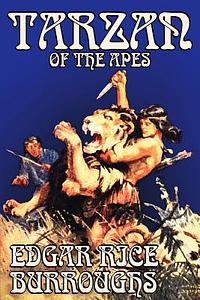Take a photo of a barcode or cover
Tarzan was an entertaining book, but it was also a very straightforward read. It lacked some depth and character development to be on the next level. I can't believe ERB wrote something like 20 books in this series. Seems like he pioneered the whole sequel thing before it caught on.
adventurous
challenging
emotional
hopeful
informative
inspiring
lighthearted
mysterious
reflective
tense
medium-paced
Plot or Character Driven:
A mix
Strong character development:
Yes
Loveable characters:
Yes
Diverse cast of characters:
Yes
Flaws of characters a main focus:
Yes
A million times better than I expected! Wonderful writing style!
John Clayton, Lord of Greystoke is asked by the crown to investigate claims made by African natives against the crown of Denmark. Taking his young wife, he sets out, only to be castaway when the crew mutinies. While lost on the coast of Africa, his wife gives birth to a son. Eventually, Lady Greystoke gives in to her weakness and dies, which leaves Lord Greystoke prostate and unprepared when the tribe of Kerchak finds its way into their home.
Kala, a young she ape who recently lost her own child, takes the hairless child as a replacement, so Tarzan grows up among the apes, ignorant of his history.
I've seen several movie and TV versions so I wasn't sure how much came from this book. I was impressed with the story and can see why it still speaks but it is rife with the racism of the day. Tarzan succeeds because of his noble, white heritage and then excels when he finds a white man of good birth as a mentor.
Many of the things Tarzan accomplishes would be impossible, but not so out of control.
Kala, a young she ape who recently lost her own child, takes the hairless child as a replacement, so Tarzan grows up among the apes, ignorant of his history.
I've seen several movie and TV versions so I wasn't sure how much came from this book. I was impressed with the story and can see why it still speaks but it is rife with the racism of the day. Tarzan succeeds because of his noble, white heritage and then excels when he finds a white man of good birth as a mentor.
Many of the things Tarzan accomplishes would be impossible, but not so out of control.
This book posed the question, "Should you judge a book as a product of it's time, or is it fair to judge it by today's standards of morality and socially acceptable views." I flip-flopped several times when reading this book. This book is absolutely 110% a product of colonization, and is probably one of the biggest examples of colonial views in literature that I have ever read (save maybe for Heart of Darkness or when I read The Jungle Book). Because of that, it comes with all the baggage of colonization.
It is incredibly racist, both towards indigenous Africans and towards African Americans (one of the characters is a "Mammy" steriotype). It is sexist towards women and treats them as useless hysterical plot devices in need of constant saving and rescue. And, probably the least problematic, it has a very antiquated understanding of the fauna in Africa and their behavior traits.
Again, is this just a product of the early 20th century, or should these issues make Tarzan a mediocre or offensive book? I sided on the side of the latter. I felt like a lot of the book was predictable, offensive, and downright boring. I enjoyed comparing some of it to the Disney movie (which took massive liberties to clean up these issues) but still, I felt like this book did not hold up as much as some of it's contemporaries published at the same time or earlier.
I am glad I read it, just to say that I have experienced it for myself. However readers should be aware of all of these issues with the book before reading, and if you don't want to expose yourself to these things, then you might want to skip them entirely. It is something that I think absolutely appealed to the early 20th century with it's love of monster movies with damsels in distress or swash-buckling pirates and rough necked heroes. However it aged a little too much for me. I don't know if I would recommend reading this book for any other reason than being able to say you've read it. I am a little tepid now to read John Carter of Mars, but I am interested to see if Tarzan is an exception or if Burroughs will fall into the same pitfalls he did in this novel.
It is incredibly racist, both towards indigenous Africans and towards African Americans (one of the characters is a "Mammy" steriotype). It is sexist towards women and treats them as useless hysterical plot devices in need of constant saving and rescue. And, probably the least problematic, it has a very antiquated understanding of the fauna in Africa and their behavior traits.
Again, is this just a product of the early 20th century, or should these issues make Tarzan a mediocre or offensive book? I sided on the side of the latter. I felt like a lot of the book was predictable, offensive, and downright boring. I enjoyed comparing some of it to the Disney movie (which took massive liberties to clean up these issues) but still, I felt like this book did not hold up as much as some of it's contemporaries published at the same time or earlier.
I am glad I read it, just to say that I have experienced it for myself. However readers should be aware of all of these issues with the book before reading, and if you don't want to expose yourself to these things, then you might want to skip them entirely. It is something that I think absolutely appealed to the early 20th century with it's love of monster movies with damsels in distress or swash-buckling pirates and rough necked heroes. However it aged a little too much for me. I don't know if I would recommend reading this book for any other reason than being able to say you've read it. I am a little tepid now to read John Carter of Mars, but I am interested to see if Tarzan is an exception or if Burroughs will fall into the same pitfalls he did in this novel.
2.5 stars.This is a tale of two novels. I put off reading Tarzan for years, almost decades, because I figured it would be a silly, conventional pulp novel, so I was quite surprised -- at first -- to find this to be a thrilling adventure written by a seemingly natural storyteller. I was prepared for the cringe-worthy movie version of events (“Me Tarzan -- you Jane!”), so it was a pleasure to discover a more nuanced (and equally adventurous) narrative of a foundling raised by apes. It reminded me of the opening of Arthur C. Clarke’s [b:2001: A Space Odyssey|70535|2001 A Space Odyssey (Space Odyssey, #1)|Arthur C. Clarke|https://images.gr-assets.com/books/1432468943s/70535.jpg|208362], complete with heavy symbolic notions, of which Burroughs was certainly aware, since he makes a direct reference to the allegorical nature of the plot.
But then...things begin to turn. With the coming of other humans into the narrative, suddenly this novel begins to be creaky...and then to wobble...and eventually to go completely off the rails. No amount of willing suspension of disbelief can prepare one for what follows in the second half of the novel. Somehow we are expected to believe that Tarzan can teach himself to read. By pure coincidence, the first white people to stumble upon Tarzan include his cousin!
And then the dreaded cringe-worthy moments begin to occur rapidly, especially the dated racial language -- and that’s putting it rather gently. The dialogue is atrocious. (“Tut-tut,” said Professor Porter. “Tut-tut!”) Once Tarzan makes his way outside the jungle, things just get ridiculous. Within a couple months, he learns to speak French and English while becoming a British gentleman. The novel ends with Tarzan in a suit and driving a car in rural Wisconsin, just a couple months removed from swinging through the jungle!
All in all, this was a fun way to spend a couple days. The novel ended up being exactly what I thought it would be: pure silly escapism. If I had read it as a teenager, I might have enjoyed it more.
But then...things begin to turn. With the coming of other humans into the narrative, suddenly this novel begins to be creaky...and then to wobble...and eventually to go completely off the rails. No amount of willing suspension of disbelief can prepare one for what follows in the second half of the novel. Somehow we are expected to believe that Tarzan can teach himself to read. By pure coincidence, the first white people to stumble upon Tarzan include his cousin!
And then the dreaded cringe-worthy moments begin to occur rapidly, especially the dated racial language -- and that’s putting it rather gently. The dialogue is atrocious. (“Tut-tut,” said Professor Porter. “Tut-tut!”) Once Tarzan makes his way outside the jungle, things just get ridiculous. Within a couple months, he learns to speak French and English while becoming a British gentleman. The novel ends with Tarzan in a suit and driving a car in rural Wisconsin, just a couple months removed from swinging through the jungle!
All in all, this was a fun way to spend a couple days. The novel ended up being exactly what I thought it would be: pure silly escapism. If I had read it as a teenager, I might have enjoyed it more.
I really don't know how to rate this book. It is such a creature of its time. Having read it, after many years of seeing the movies, I am puzzled at its continuing popularity. There is sexism. There is racism. There's plenty of aristocratic fabtasy. These are to be expected in early 20th century popular fiction. However, I am at a loss to explain why we continue to evaluate so highly. One might compare it to the Zane Grey westerns. In those, at least we learn something about the old west. Here, we learn almost nothing about Africa. That is a shame.
This was a surprisingly engaging read. It was a little hard to not get too hung up on the racism and sexism of Burroughs's time, but the constant action kept my interest.
This was an all right book. It wasn't amazing, it wasn't horrible. But, maybe it's just not my cup of tea. I don't know.
One of my all time favorite books!!! I love all the characters, the plot is fabulous, excellent read!!



